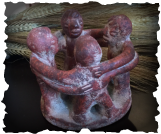- Emerson Powery (adapted)
READING:
That triggered a response from one of the guests: “How fortunate the one who gets to eat dinner in God’s kingdom!” Jesus followed up. “Yes. For there was once a man who threw a great dinner party and invited many. When it was time for dinner, he sent out his servant to the invited guests, saying, ‘Come on in; the food’s on the table.’ “Then they all began to beg off, one after another making excuses. The first said, ‘I bought a piece of property and need to look it over. Send my regrets.’ “Another said, ‘I just bought five teams of oxen, and I really need to check them out. Send my regrets.’ “And yet another said, ‘I just got married and need to get home to my wife.’ “The servant went back and told the master what had happened. He was outraged and told the servant, ‘Quickly, get out into the city streets and alleys. Collect all who look like they need a square meal, all the misfits and homeless and wretched you can lay your hands on, and bring them here.’ “The servant reported back, ‘Master, I did what you commanded—and there’s still room.’ “The master said, ‘Then go to the country roads. Whoever you find, drag them in. I want my house full! Let me tell you, not one of those originally invited is going to get so much as a bite at my dinner party.’”
- Luke 14.15-24 (The Message)
REFLECTION:
In the biblical tradition, grace and compassion have long been imaged through the ancient customs of hospitality and table fellowship. One could pass over stories about shared meals as incidental, but this would be a mistake. Table fellowship is especially significant in the gospels, because it provides insight into Jesus’ teaching and convictions.
This is why we have chosen table fellowship as the theme of our Lenten sermon series, The Compassionate Table of Jesus. As we examine several narratives of Jesus sharing meals with everyone from Pharisees to those on the fringe of society, we will hopefully glean insights into the nature of grace and compassion, and how they should impact the way we live our faith.
We will begin this Sunday with a consideration of Luke’s parable of the great dinner party (or, the feast) in chapter 14. I don’t want to give away all of my thunder, so I will offer a challenge for you. As you reflect on the parable between now and Sunday, seek to identify those who are worthy of a seat at God’s welcome table, or if worthiness has anything to do with it; and seek to identify what insights are given into the scope of grace and compassion. You might do this in Lectio Divina style (Divine Reading) meditating on each of the above questions as you read through the passage several times. On Sunday, we will compare the fruits of our efforts. I hope to worship with you then.


 RSS Feed
RSS Feed



